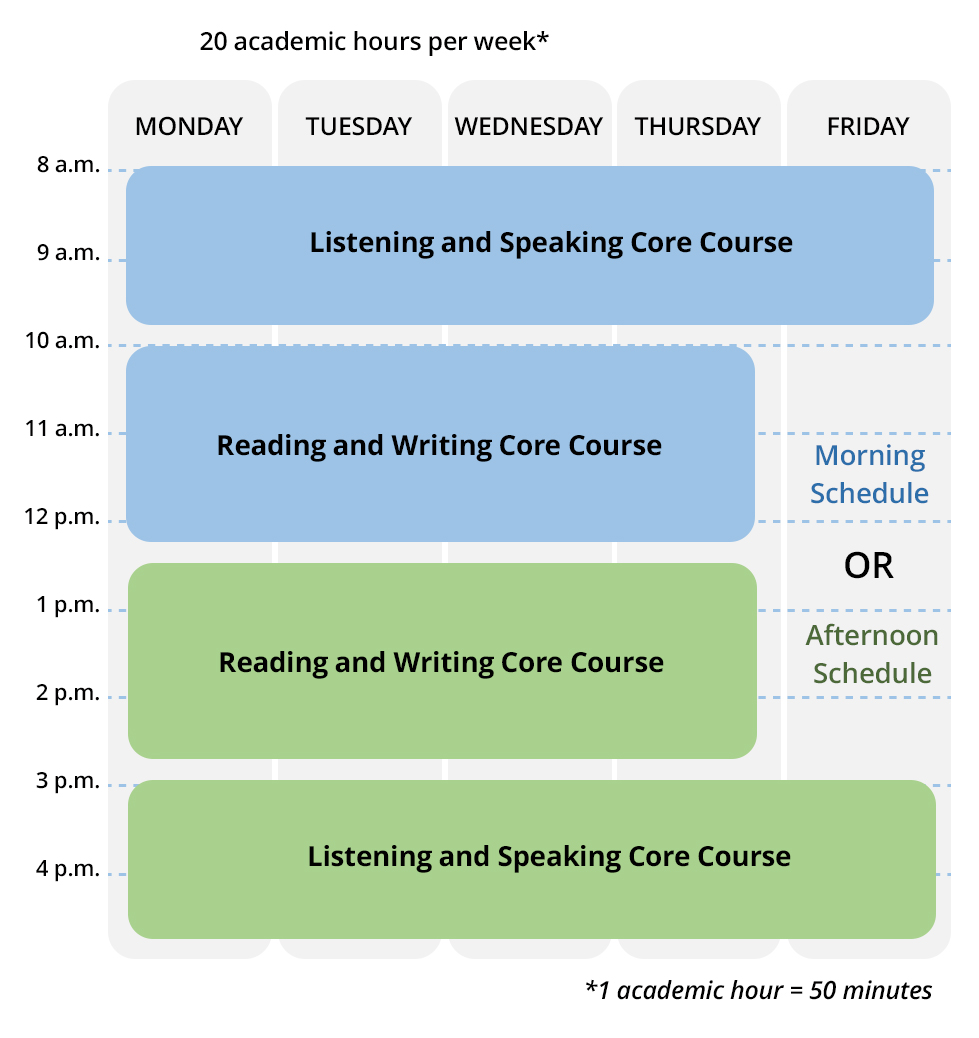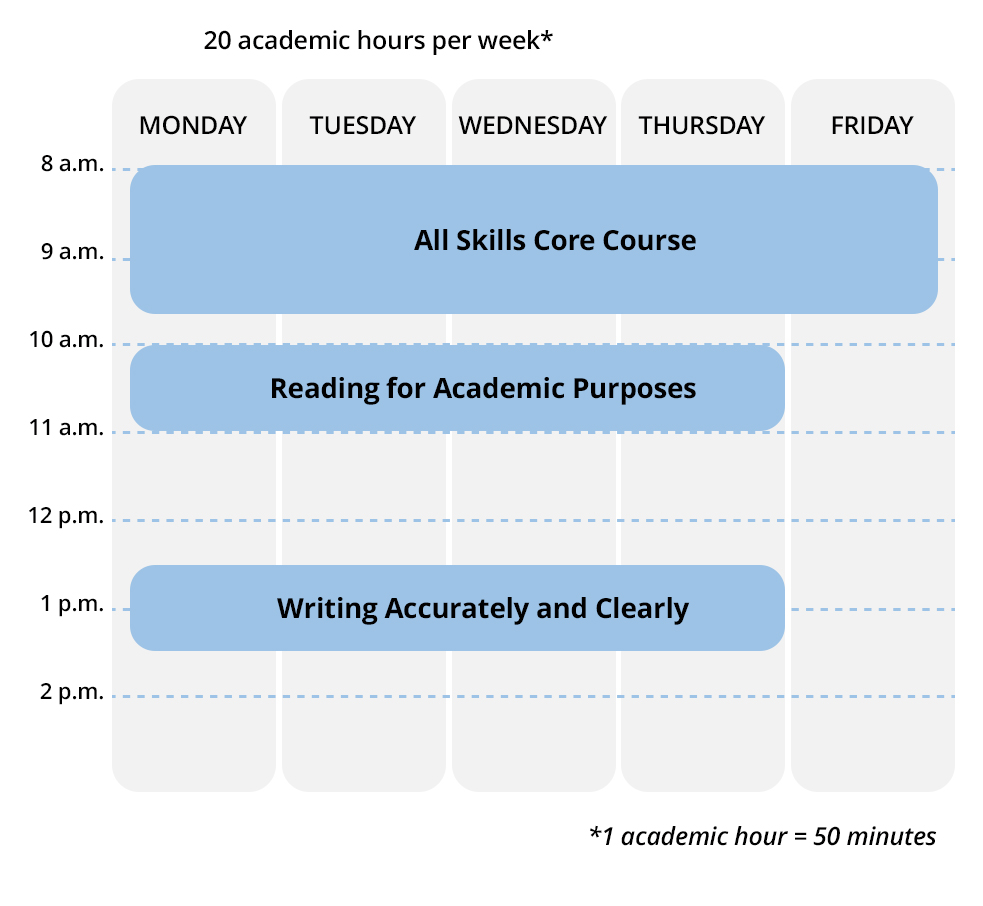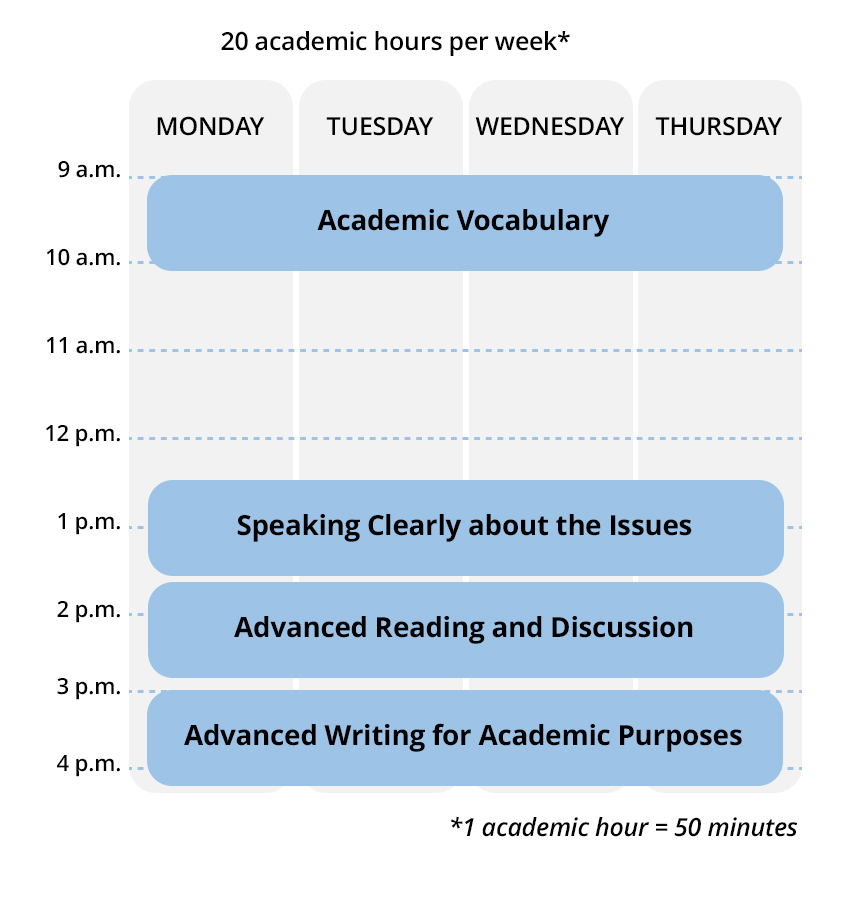
As an IP student, you will take a combination of core and/or elective classes depending on your level. All courses are designed to help you build fluency throughout your language development. All levels include 20 academic hours of classroom time per week.
Note: The ELP does not teach beginners (level 100 and level 200).
Pre-intermediate to intermediate levels (300-500)
At the pre-intermediate to intermediate levels, you will take two core courses that focus on developing your listening, speaking, reading, writing, grammar, and vocabulary skills. Each level has a set of core courses that build on the skills of the previous level.
Core courses
- 300-Level Reading and Writing
- 300-Level Listening and Speaking
- 400-Level Reading and Writing
- 400-Level Listening and Speaking
- 500-Level Listening and Speaking
- 500-Level Reading and Writing
Sample class schedule

High-intermediate levels (600-700)
At the high-intermediate levels, you will take one all-skills core class and two elective courses focused on specific skills relevant to your language goals.
Each level (600-700) has specially designed courses that build on the skills taught in the previous level. Elective options at the high-intermediate level include topics like pronunciation, TOEFL preparation, and reading and writing for academic purposes.
Core courses
- 600-Level Core Course (Integrated Skills)
- 700-Level Core Course (Integrated Skills)
Elective courses
Grammar/vocabulary skills courses:
- Intermediate Grammar (600/700)
- Vocabulary Development A (700/800)
- Vocabulary Development B (700/800)
Reading/writing skills courses:
- Intermediate Reading and Discussion (600/700)
- Reading for Academic Purposes A (600/700)
- Reading for Academic Purposes B (600/700)
- Writing Accurately and Clearly A (600/700)
- Writing Accurately and Clearly B (600/700)
- Writing for Academic Purposes (600/700)
Speaking/listening skills courses:
- Clear Pronunciation A (600/700)
- Clear Pronunciation B (600/700)
- Dramatically Speaking (600/700)
- Listening to Lectures (600/700)
Business English courses:
- Breakthrough Reading (700/800)
- Professional Writing (700/800)
- Speaking in the Working World (700/800)
- Target Listening (700/800)
University application and test preparation courses:
- Listening and Speaking Skills for the IELTS (600/700/800)
- Reading and Writing Skills for the IELTS (600/700/800)
- Listening and Speaking Skills for the TOEFL iBT (600/700/800)
- Reading and Writing Skills for the TOEFL iBT (600/700/800)
- Skills for Success in US Universities (700/800)
- UNICONN: Essays and Statements Workshop (600/700/800)
- UNICONN: Writing the Graduate Application Statement (600/700/800)
- UNICONN: Writing the University Application Essay (600/700/800)
- UNICONN PLUS: Test Preparation (600/700/800)
Sample class schedule

Advanced level (800)
At the advanced level, you will take four elective courses focused on specific skills relevant to your language goals. There are over 25 elective options at the advanced level, so you can take multiple sessions without repeating courses. Elective options at the advanced level include topics like speaking in the working world, English for engineering, and advanced writing for academic purposes.
Elective courses
Grammar/vocabulary skills courses:
- Academic Vocabulary A (800)
- Academic Vocabulary B (800)
- Advanced Grammar A (800)
- Advanced Grammar B (800)
- Vocabulary Development A (700/800)
- Vocabulary Development B (700/800)
Reading/writing skills courses:
- Advanced Reading and Discussion (800)
- Advanced Reading for Academic Purposes A (800)
- Advanced Writing for Academic Purposes B (800)
- Reading Academic Texts (800)
- Research Paper Writing A (800)
- Research Paper Writing B (800)
Speaking/listening skills courses:
- Advanced Speaking and Listening for Academic Purposes A (800)
- Advanced Speaking and Listening for Academic Purposes B (800)
- Speaking Clearly about the Issues A (800)
- Speaking Clearly about the Issues B (800)
Business English courses:
- Breakthrough Reading (700/800)
- Powerful and Professional Presentations (800)
- Professional Writing (700/800)
- Speaking in the Working World (700/800)
- Target Listening (700/800)
University application and test preparation courses:
- Listening and Speaking Skills for the IELTS (600/700/800)
- Reading and Writing Skills for the IELTS (600/700/800)
- Listening and Speaking Skills for the TOEFL iBT (600/700/800)
- Reading and Writing Skills for the TOEFL iBT (600/700/800)
- Skills for Success in US Universities (700/800)
- UNICONN: Essays and Statements Workshop (600/700/800)
- UNICONN: Writing the Graduate Application Statement (600/700/800)
- UNICONN: Writing the University Application Essay (600/700/800)
- UNICONN PLUS: Test Preparation (600/700/800)
Content-based language courses:
- English for Engineering A (800)
- English for Engineering B (800)
- English for Science (800)
- News in English (800)
- Reading, Writing, and Speaking Critically about Science (800)
Sample class schedule

CEFR-ELP IP level equivalency
The Intensive Program has six levels (from 300 to 800). Each of the six levels corresponds to a particular level of proficiency. The levels, brief proficiency descriptions, and their relation to the Common European Framework of Reference (CEFR) are:
IP Level |
Proficiency Description |
CEFR |
|---|---|---|
300 |
A student at this level uses a limited range of English adequate for short communication and practical needs. Problems cause frequent breakdown of communication, but message usually recovered with repetition and/or assistance. |
A2- |
400 |
A student at this level uses a basic range of English sufficient for familiar and non-pressuring situations. Frequent problems restrict prolonged communication, but message communicated with repetition and/or assistance. |
A2+ |
500 |
A student at this level uses English adequately in familiar situations. Rather frequent problems but usually succeeds in communicating general message. |
B1- |
600 |
A student at this level uses English independently and effectively in familiar and moderately difficult situations. |
B1+ |
700 |
A student at this level uses English competently in a variety of personal and professional situations but with noticeable problems. Communication is usually effective. When difficulties arise communication is recovered with ease. |
B2- |
800 |
A student at this level uses English effectively in most situations with few problems. Communication is effective and consistent, with few hesitations and uncertainties. |
B2+ |
*Academic hours are used in universities in order to allow students enough time to travel between classes. 1 academic hour = 50 minutes.
